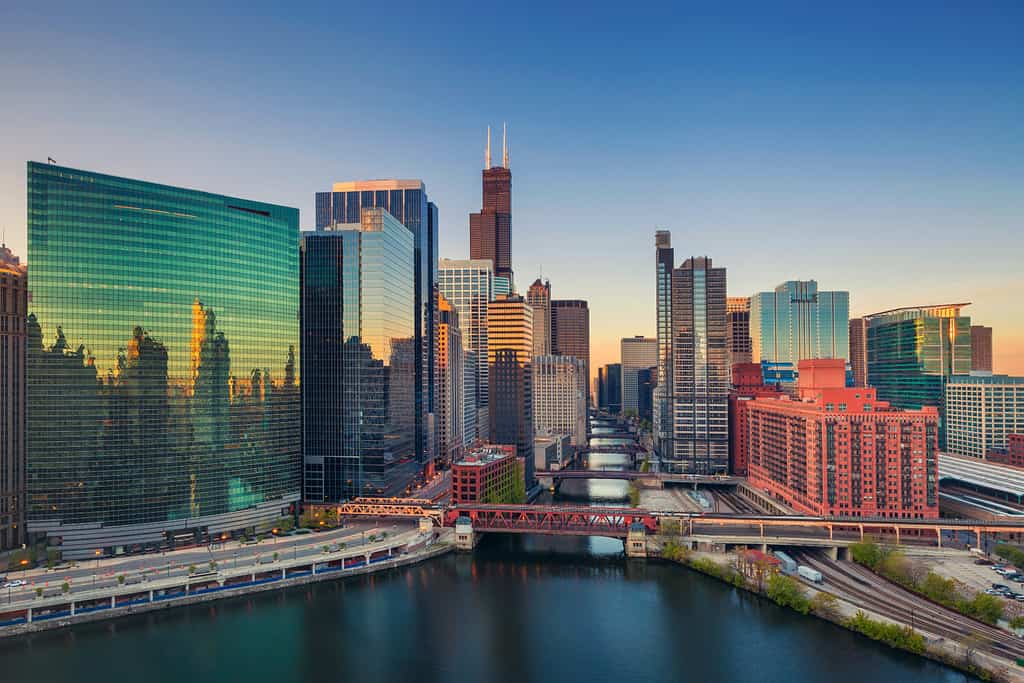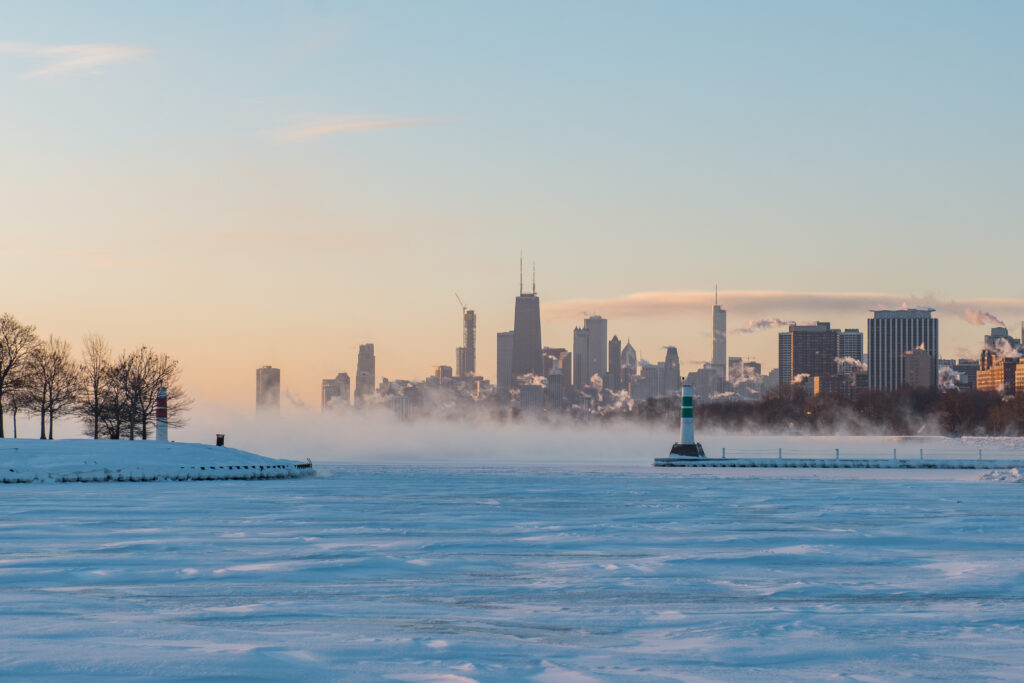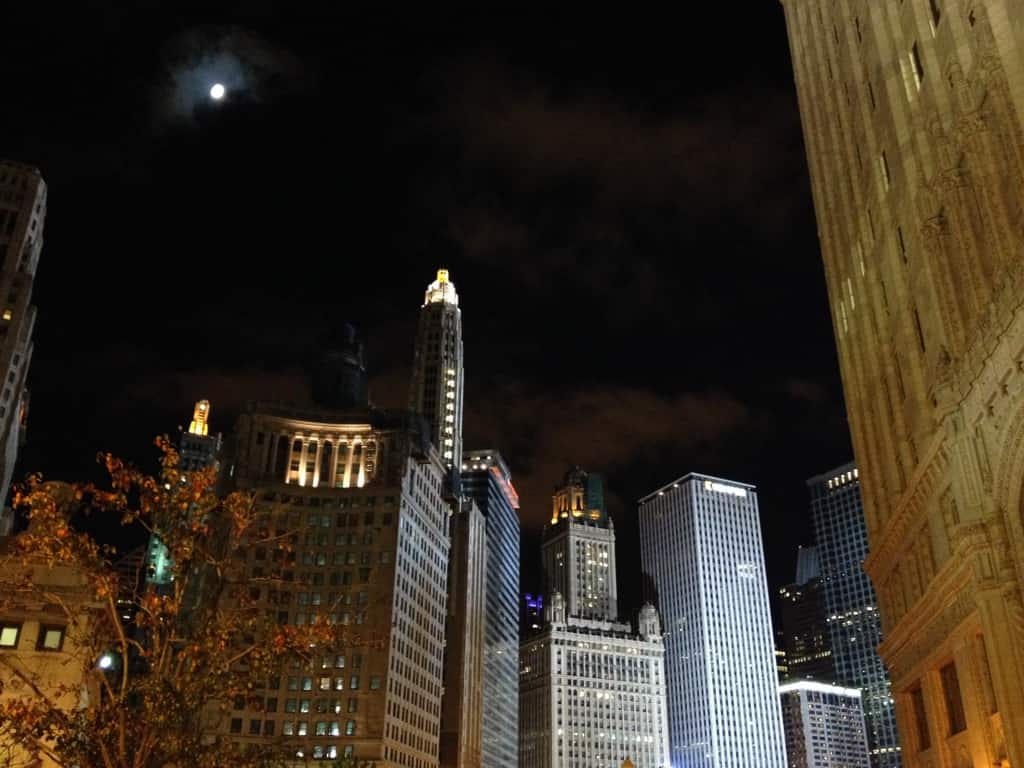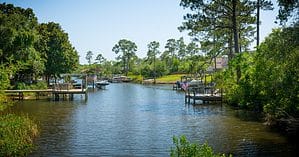The name of Chicago is a French version of a native word shikaakwa, which means wild onion in the local Irenwa language of the region. French explorer Robert de LaSalle first heard the locals refer to the area as “Checagou” in 1679 because of the many wild onions that used to grow there.
American and European explorers and settlers adopted the local native name for the place. The name stuck until the actual Town of Chicago was organized in 1833, and the city replaced it in 1837.
What Was Chicago Called Before?

The rivers that made Chicago so successful and famous right right through the center. Native settlements occupied the area for hundreds of years. The Army built Fort Dearborn along these banks.
©Rudy Balasko/Shutterstock.com
The Miami Confederacy, a confederation of North American tribes, had a settlement in the same area as modern-day Chicago as early as 1671. This settlement was in the area known as shikaakwa, which the European explorers used to refer to the village. Its location near a high-traffic trading area, and at the entrance to the Mississippi River system, made the village a popular location for explorers and traders passing through the region. Since the locals referred to the area as shikaakwa, and Chicago is a French version of that word, we could say it has had the same name for hundreds of years!
A series of wars and conflicts between different tribes and European powers saw the settlement rise and fall a number of times over the subsequent decades. Some tribes would settle the area and then be forced to leave it due to war. The French and other Europeans largely abandoned the area during the 1720s due to the frequency of Native American raids.
The first non-native version of Chicago was founded by a free back man, Jean Baptiste Point du Sable, in 1790.
However, the U.S. Army constructed Fort Dearborn in the exact location Chicago is today. The fort did not expand into a city but remained a separate zone as the city grew around it. British and Native American forces destroyed it in the War of 1812. The Army rebuilt it later. By the time the City of Chicago was founded in 1837, the fort had been decommissioned but not demolished. The last vestiges of the fort were finally destroyed during the Great Chicago Fire of 1871.
Other Names for Chicago

Locals call Chicago Chiberia during cold seasons, like the 2016 polar vortex, pictured here.
©iStock.com/mkgphotography.co
There are at least 16 well-known nicknames and alternate names for Chicago. In fact, many of them are so ubiquitous in Chicago that you can use them interchangeably without a problem in conversation.
Windy City
This is the most popular and well-known of Chicago’s nicknames. However, there is no definitive answer as to why or how it earned this nickname. Chicago isn’t even the windiest city in North America! Some origin stories point to a rivalry with the neighboring city Cincinnati that might have created the term or the corrupt politics of Chicago. Whatever the reason, people continue to use the name today.
Chi-town
This is also a well-known and common nickname, but its use comes with some caveats! According to some reporters, locals don’t really like using this name and can recognize and avoid visitors by their continued use of the term. It remains, however, a popular nickname for the city during the many festivals that take place during the year, and for marketing and branding.
Second City
This nickname started as an insult by a writer for the New Yorker. The writer hated Chicago and compared it to his hometown of New York in a series of articles in which he insulted and disparaged and complained about Chicago. The people of Chicago have since embraced the insult, turning it into a point of pride for their beloved city.
Chiberia
Chiberia is a portmanteau of Chicago and Siberia, the cold region that covers all of North Asia. This nickname is popular during the winter when Chicago experiences intense, biting cold and freezing winds. A meteorologist in the city created the term in 2014 during a particularly cold season.
The Great American City
Last, but certainly not least, this nickname is not one to pass over lightly! The novelist Norman Mailer described Chicago as “perhaps [the last] of the great American cities”. Harvard professor Robert J. Sampson described said Chicago “is arguably the most quintessential American city”. It has attracted, and created, the most unique and flavorful aspects of American culture and has definitely earned this nickname.
Additional nicknames for Chicago include Mud City, City by the Lake, The City that Works, Heart of America, The Great American City, The City Beautiful, The 312, City of Big Shoulders, and Paris on the Prairie.
Conclusion

The Chicago skyline from downtown, taken by the author. Chicago is famous for its nightlife. Jazz bars, comedy clubs, and more make this a city that is never quiet.
While the name Chicago might not have a complicated and intricate history, the city and the region it is named for is rich in culture and life. It is one of the most populated and prosperous cities in North America, a tourist destination, and a heaven for foodies. Pride in the Chicago name runs deep with Chicago natives, and even with residents of Illinois in general. Chicago, named for the wild onions that grow along the banks of its rivers, is truly The Great American City.
The photo featured at the top of this post is © Sean Pavone/Shutterstock.com
Thank you for reading! Have some feedback for us? Contact the AZ Animals editorial team.







